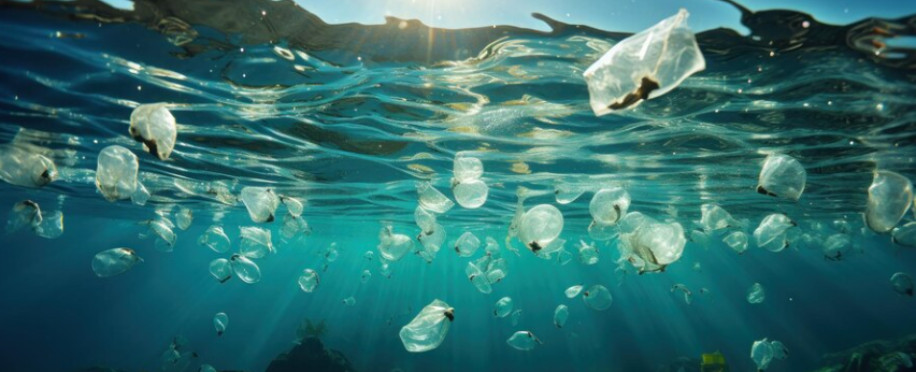Copyright © 2025 lmitac.com All Rights Reserved. Contact - Terms and Conditions - Privacy Policy - Quality Policy - Become an instructor - Vacancies - Sitemap
London Maritime Academy is a trade name for London Premier Groupversion: 2.9.0
London Maritime Academy is a trade name for London Premier Group

Posted on : 2/17/2024, 8:23:37 PM
Marine pollution, among all other types of pollution, is the most threatening effect on our environment, but how does it happen? What is it affecting? What can we do to help?
This is what we’re here to discuss; read along to learn more about marine pollution, what it is and what you need to do to stop it.
Marine pollution is considered one of the most dangerous and damaging phenomena happening to our planet today, and while many people think, “There are a lot of oceans, we can never contaminate all that!” on the contrary, marine pollution can have devastating effects, here are 5 of them:
Habitat Destruction: Marine pollution, especially from oil spills and toxic chemicals, decimates critical habitats such as coral reefs. Through this destruction, biodiversity suffers since marine species depend on coral reefs.
Loss of Species: Plastic waste in the form of pollution is a massive threat to marine biodiversity. Animals can get caught in discarded fishing nets and other chromatic waste, which puts them in danger of injury or death. Moreover, toxins discharged into the water affect the reproductive cycles, leading to a loss in the numbers of marine species.
Contamination of Seafood: Toxic pollutants, like heavy metals and pesticides, accumulate in marine organisms such as fish and shellfish. Consuming contaminated seafood can result in adverse effects on human health, such as the occurrence of neurological problems, reproductive problems, and the increased chance of getting cancer.
Microplastic Ingestion: Plastic plastic debris from the ocean causes marine pollution, which later degrades into microplastics. Marine fauna inadvertently ingests this microplastic, which can become a part of the human food chain by seafood consumption. There are negative health effects of ingesting microplastics, although the full extent of the impact is still being investigated.
Disruption of Ecosystem Services: The marine ecosystems are essential for various ecosystem services, including carbon sequestration, oxygen production, and climate regulation. Pollution disturbs these services, impacting the balance of ecosystems and negatively influencing human welfare.
Now that you know how drastic marine pollution is to the environment, let’s dive into the various causes of this pollution and how it happens; here are 4 sources of marine pollution:

Industrial Waste: Industries discharge extensive toxic chemicals and substances into rivers and oceans. These pollutants encompass heavy metals, pesticides, chemicals, and oils. These inappropriate waste disposal by industrial activities contribute to marine pollution.
Plastic Waste: Plastic pollution is a big issue in the marine environment. The discarded plastics, including single-use plastics and fishing nets, end up in the ocean, harming sea animals and turning into toxic microplastics.
Sewage and Wastewater: Sewage and industrial effluents from coastal populations are directly discharged into the ocean without appropriate treatment, which poses problems to aquatic life. This spill carries along pathogens, nutrients, and other chemicals contaminating the water they come into contact with, worsening water quality and jeopardising the marine ecosystem's health.
Oil Spills: Accidents of oil pollution from offshore oil rigs, tankers, and pipelines are catastrophic marine sources of pollution. These spills cause a massive oil flow to the water, so aquatic life is immediately harmed, and ecosystems are damaged in the long term.
Marine pollution is a severe problem that needs continued commitment and effort. Here are some actions we can take to prevent marine pollution and protect the health of our oceans:
Reduce, Reuse, Recycle: Apply the three R's of waste management. Try to ‘reduce’ your use of single-use plastic items and select ‘reusable’ ones instead. When recycling, make sure that you observe guidelines to prevent contamination.
Proper Waste Disposal: Throw away waste, particularly toxic substances, carefully. Dispose of household hazardous chemicals, motor oil, and batteries at designated collection centres to keep them away from water bodies.
Minimise Plastic Use: Avoid plastic bags, straws, bottles, and all other disposable items.
Support Recycling Programs: Actively take part in local recycling programs. Sort recyclable materials to enable them to be processed well.
Participate in Clean-up Events: Take part in or generate beach-clean-up projects aimed at removing litter and trash from coastal areas. Taking part in these activities reduces the amount of garbage that enters the ocean and harms marine life.
Educate and Raise Awareness: Give information about marine pollution damage among friends, relatives, and your local community. Promote sustainable practices to others and choose wisely to save our oceans.
Support Legislation and Policy Changes: Push for the tighter management of waste and pollution control. Support organisations and initiatives fighting for the protection of marine ecosystems and making an impact on policy changes.
Promote Sustainable Fishing Practices: Support fishing practices with minimal bycatch and habitat destruction. Select seafood that is sustainably farmed and has gained certifications on the same.
Sustainability, preventing marine pollution, and environmental initiatives aren’t just buzzwords we use as marketing campaigns. The earth needs all our collective efforts to create a change that needs to happen fast.
Through Maritime training courses, you can start your first step into knowing what you’re doing wrong and how you can fix it. These courses are your gateway to conscious shipping and green operations. Join today for the earth, your dearest friend.
Remember, every action counts in the fight against marine pollution. By making small changes in our daily lives and promoting awareness, we can contribute to the preservation of our oceans and the well-being of future generations.